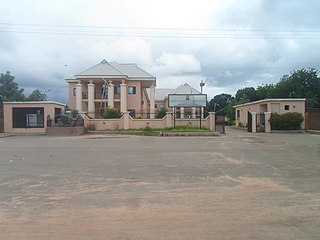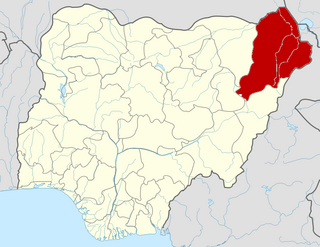
Maiduguri is the capital and the largest city of Borno State in north-eastern Nigeria, on the continent of Africa. The city sits along the seasonal Ngadda River which disappears into the Firki swamps in the areas around Lake Chad. Maiduguri was founded in 1907 as a military outpost by the British Empire during the colonial period. As of 2022, Maiduguri is estimated to have a population of approximately two million people, in the metropolitan area.

Borno is a state in the North-East geopolitical zone of Nigeria. It is bordered by Yobe to the west for about 421 km, Gombe to the southwest for 93 km, and Adamawa to the south while its eastern border forms part of the national border with Cameroon for about 426 km. Its northern border forms part of the national border with Niger for about 223 km, mostly across the Komadougou-Yobe River, and its northeastern border forms all of the national border with Chad for 85 km. It is the only Nigerian state to border up to three countries. It takes its name from the historic emirate of Borno, with the emirate's old capital of Maiduguri serving as the capital city of Borno State. The state was formed in 1976 when the former North-Eastern State was broken up. It originally included the area that is now Yobe State, which became a distinct state in 1991.

The University of Maiduguri (UNIMAID) is a Federal higher institution located in Maiduguri, the capital city of Borno State in Northeast Nigeria. The university was created by the federal government of Nigeria in 1975, with the intention of its becoming one of the country's principal higher-education institutions. It enrolls about 25,000 students in its combined programs, which include a college of medicine and faculties of agriculture, arts, environmental science, Allied health science, Basic medical science, dentistry, education, engineering, law, management science, pharmacy, science, social science, and veterinary medicine. With the encouragement of the federal government, the university has recently been increasing its research efforts, particularly in the fields of agriculture, medicine and conflict resolution, and expanding the university press. The university is the major higher institution of learning in the north-eastern part of the country.

Boko Haram, officially known as Jamā'at Ahl as-Sunnah lid-Da'wah wa'l-Jihād, is a self-proclaimed jihadist terrorist organization based in northeastern Nigeria and also active in Chad, Niger, northern Cameroon, and Mali. In 2016, the group split, resulting in the emergence of a hostile faction known as the Islamic State's West Africa Province.
Marte is a Local Government Area of Borno State, Nigeria, on the western coast of Lake Chad. Its headquarters are in the town of Marte

Bama is a town and a local government area in the central part of Borno State, Nigeria.

Gwoza is a local government area of Borno State, Nigeria. Its headquarters are in the town of Gwoza, a border town "about 135 kilometres South-East of Maiduguri." The postal code of the area is 610.
Monguno is one of the local government areas of Borno State, in northeastern Nigeria.

The Boko Haram insurgency began in July 2009, when the militant Islamist and jihadist rebel group Boko Haram started an armed rebellion against the government of Nigeria. The conflict is taking place within the context of long-standing issues of religious violence between Nigeria's Muslim and Christian communities, and the insurgents' ultimate aim is to establish an Islamic state in the region.
Timeline of the Boko Haram insurgency is the chronology of the Boko Haram insurgency, an ongoing armed conflict between Nigerian Islamist group Boko Haram and the Nigerian government. Boko Haram have carried out many attacks against the military, police and civilians since 2009, mostly in Nigeria. The low-intensity conflict is centred on Borno State. It peaked in the mid-2010s, when Boko Haram extended their insurgency into Cameroon, Chad and Niger.
The following lists events from 2014 in Nigeria.

Mohammed Indimi OFR is a Nigerian businessman and philanthropist. He is the founder and chairman of Oriental Energy Resources (OER), a privately held Nigerian oil exploration and production company. As of October 2023, his net worth was estimated at US$500 Million by Forbes. His net worth plummeted due to crashing oil prices as well as the floating of the Naira.

On the evening of September 20, 2015, a series of bombings took place in Maiduguri and Monguno, Nigeria, killing at least 145 people and injuring at least 97 others. The majority of casualties occurred in Maiduguri where four explosions killed at least 117 people.

On February 9, 2016, two female suicide bombers affiliated with Boko Haram detonated their explosives killing more than 60 people and injured 78 others at a camp for displaced people in Dikwa, Nigeria. Officials said three suicide bombers had infiltrated the camp disguised as refugees at about 6:30 am with two of them, both women between the ages of 17 and 20, setting off their bombs as refugees were queuing for rations. A third bomber identified as Hauwa(but not her real name) refused to kill herself after entering the camp and discovering her relatives were there, while two others also refused to set off their vests and escaped the camp.
On 17 January 2017, a Nigerian Air Force jet mistakenly bombed an internally displaced persons camp near the Cameroonian border in Rann, Borno State. They had believed it was a Boko Haram encampment. The bombing left at least 115 people dead, including six Red Cross aid workers, and left more than 100 injured.

On 22 March 2017, at approximately 4:30 a.m, a series of bomb blasts occurred in three locations in the Muna Garage area of Maiduguri, Borno State, northeastern Nigeria. The blasts occurred at the Muna Garage internally displaced persons (IDPs) camp.
Dalori is a suburban town near Maiduguri, Borno, northeastern Nigeria. Since March 2015, it hosts one of the largest internally displaced persons camp created during the Boko Haram insurgency, with more than 15,000 people, most of them coming from the southeast of Borno State. Dalori camp is located on the road from Maiduguri to Konduga, Bama and the border between Nigeria and Cameroon, 15 kilometers southeast of Maiduguri.
The 2023 Borno State gubernatorial election took place on 18 March 2023, to elect the Governor of Borno State, concurrent with elections to the Borno State House of Assembly as well as twenty-seven other gubernatorial elections and elections to all other state houses of assembly. The election—which was postponed from its original 11 March date—was held three weeks after the presidential election and National Assembly elections. Incumbent Governor Babagana Umara Zulum (APC) was re-elected by a 74% margin over PDP nominee — businessman Mohammed Ali Jajari.
Borno State, Nigeria, faced flooding after the collapse of the Alau Dam on 10 September 2024. The Maiduguri and Jere local government areas were particularly affected: according to the National Emergency Management Agency, over 70% of the residents in Maiduguri were displaced. At least 150 people died. The United Nations refugee agency in Nigeria described it as the worst to hit the city in thirty years, affecting over one million people.









